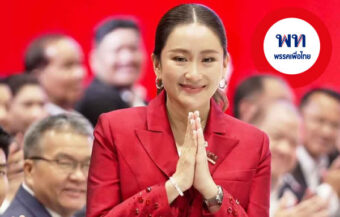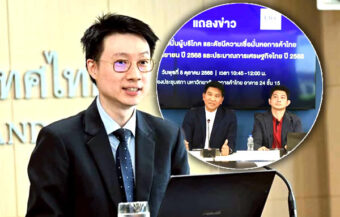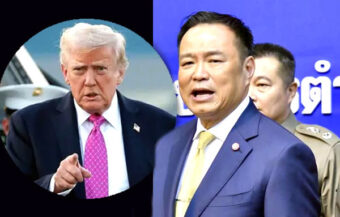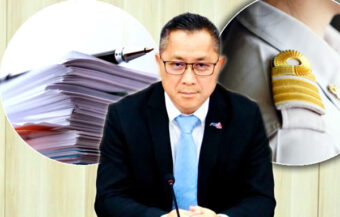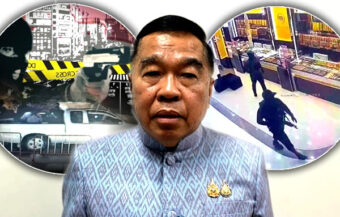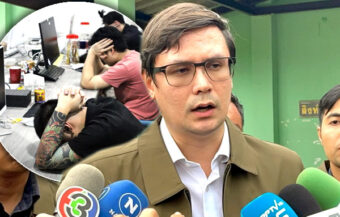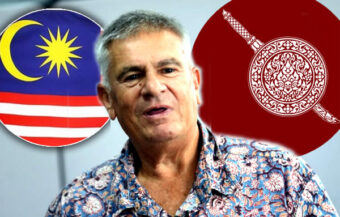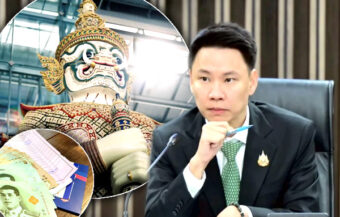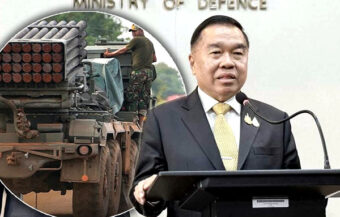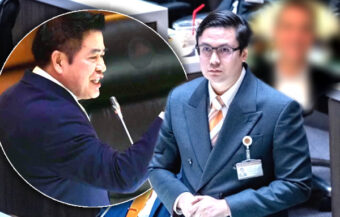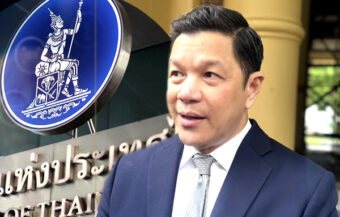Desperate bid by the caretaker government to present the Burmese junta regime in Nay Pyi Taw as legitimate has drawn hostility from politicians in Thailand, other ASEAN countries and Southeast Asian foreign policy experts. Deputy Prime Minister Don Pramudwinai steadfastly insists the move is in Thailand’s strategic interests.
The last desperate efforts earlier this week by the outgoing government to bring the failing Burmese junta in from the cold appears to have backfired with key countries within the ASEAN bloc failing to take part and also making their displeasure known about the initiative. One Australian expert has described the two-day dialogue attended by officials from a handful of ASEAN countries, as well as India and China, as damaging and destructive to the ASEAN bloc. In the aftermath of the talks, however, Thailand’s Deputy Prime Minister Don Pramudwinai defended the meetings that took place as an effort to preserve Thailand’s strategic interests given the country’s unique position as Myanmar’s neighbour with an extensive border. Mr Don also warned that as matters stood, the rising conflict there threatened regional stability and must be addressed.
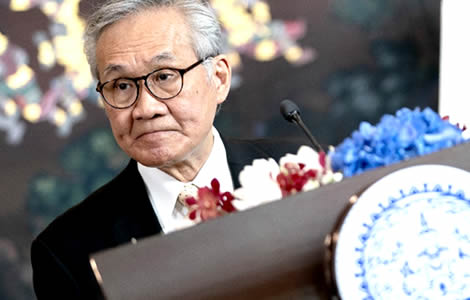
The outgoing government is facing criticism both at home and abroad over its sudden initiative launched last week to host an informal dialogue between the unrecognised Myanmar military junta and representatives from a handful of member ASEAN countries and other parties who agreed to attend the controversial two-day event in Pattaya held on Sunday and Monday last.
Defending the outgoing government, Deputy Prime Minister Don Pramudwinai highlighted the country’s extensive 2,400 km border with Myanmar and the impact of what is an escalating civil war there in which the junta is losing its grip on power.
Chinese representatives attended the informal talks hosted last Sunday and Monday by the Thai government with officials of Myanmar’s junta regime
The talks were attended by the new foreign minister appointed by the Burmese junta and other officials who met representatives from Cambodia, Laos, Vietnam, Brunei as well as India and China.
The dialogue is known to have irritated key ASEAN members including the current chair of the 10-nation bloc Indonesia when it was sprung on unsuspecting diplomats last week given just five days’ notice.
Hated Burmese junta regime seeks peace talks as its grip on power across the country unravels
The talks came at a time of unprecedented losses for the Burmese military and the growing momentum of the National Unity Government (NUG) in Burma. It claims to be the legitimate democratic power in the country and has formed a strong and flexible understanding with ethnic militias that have for decades been at war with Myanmar’s feared and now discredited military, the Tatmadaw.
The junta’s armed forces are experiencing recruitment problems, desertions and defections to the People’s Defence Armed Forces (PDF), the military force of the democratic government which now controls vast swathes of what is the Republic of the Union of Myanmar, a country which has descended into bloody civil war and in which tens of thousands of people have died since February 2021.
Bangkok tries to bring Nay Pyi Taw in from the cold as it fights a losing war against Burmese democratic forces and faces isolation on the world stage
Mr Don appeared to acknowledge the situation this week when he suggested that there was an urgent need to quell the fighting.
‘Without a dialogue with the junta, how can we find a way out?’ he asked reporters this week.
The Thai Foreign Minister, clearly on a defensive footing, in the face of opposition to his initiative, was adamant that the kingdom had more at stake than other countries including refugees fleeing the fighting from Myanmar across its border, loss of trade and investment as well as the escalating conflict, posing a threat to regional stability with the rising possibility that the generals in Myanmar may be defeated by a popular national uprising demanding a return to democracy.
Mr Don appeared to attribute the junta’s loss of control over Burma to the troubled country’s armed ethnic militias and not to the democratic government’s armed forces, the People’s Defense Armed Forces (PDF).
‘The circumstances have changed greatly. There is more conflict in Myanmar. Most of them involve ethnic minority groups. These are the reasons why we see the necessity for interacting with Myanmar,’ Deputy Prime Minister Don declared.
Foreign Minister Don insisted the talks held this week were in Thailand’s national interest and were a routine activity for the caretaker government
He also defended the outgoing government for launching the initiative saying the dialogue was part of ongoing activities by the government in Bangkok to maintain the status quo and defend the kingdom’s strategic interests.
‘The role of Thailand in this meeting is not the role of a caretaker government. It is an ongoing mission. It is not a new matter. We have been dealing with the issue for the sake of the national interest,’ Mr Don said.
The two-day informal dialogue and series of meetings with international representatives and junta officials, who are no longer welcome at formal ASEAN summits, has drawn fire from the proposed eight-party coalition government which may be installed in Bangkok by the end of next month.
Pheu Thai Party leader strongly criticised the initiative and said that the new government would concentrate on supporting ASEAN’s policy on Burma
Dr Panpree Phahitthanukorn, a key Pheu Thai Party advisor and member of the party’s economic committee, made it clear that the talks which faced opposition from other leading ASEAN members who refused to attend, should not have taken place.
He criticised the initiative because it was launched peremptorily without consulting with other regional countries and with only 5 days’ notice to other foreign ministries by an interim government which may be only weeks away from being replaced.
Dr Panpree said the new, incoming government would put ASEAN, with its population of 700 million people and fast-growing economy at the centre of Thailand’s new foreign policy.
He said that two previous summits of a similar nature have proved futile and that the talks should not have proceeded in the absence of groundwork or the preparatory work required by members of the ASEAN community of nations.
Don said it was not clear when Thailand would have a new government but admitted that the two-day dialogue with the Burmese junta had upset Indonesia
In response, the wily Thai Foreign Minister Don Pramudwinai was insistent that the two days of meetings held were ultimately undertaken in Thailand’s interests.
‘This is in the interest of Thailand. I do not know how long it will take to form the new government,’ he told reporters.
Mr Don admitted that he was aware that the Thai-sponsored talks had miffed Indonesia, the country responsible for coordinating ASEAN activities at this time and which has adopted a strong line against the Burmese generals after the illegal junta failed to pursue a five-point plan devised by the bloc in 2021 to halt its violence against the civilian population and to restore peace with dialogue just months the coup of that year.
The Thai Foreign Minister admitted he was aware of the displeasure in Jakarta over his initiative but was not contrite.
‘We have explained to them that ‘we do it as a complement to you,’ disclosed Mr Don in an open briefing to reporters.
Junta reached out to imprisoned Aung San Suu Kyi
The hastily organised diplomatic initiative came in the same week it also emerged that representatives of the junta including a senior minister had reached out to the imprisoned de facto leader of the ousted government deposed in the coup d’état staged by the military on February 1st 2021.
Nobel laureate Aung San Suu Kyi has been imprisoned in the country’s capital Nay Pyi Taw after being convicted on a series of political and trumped-up charges that are not taken seriously by either the vast majority of Burma’s population or the international community.
After the initiative this week, the Ministry of Foreign Affairs in Bangkok suggested that a dialogue had been opened between parties in which new ideas had emerged.
Thai officials had failed to win over other members of Asean including Indonesia, Singapore, Malaysia and the Philippines whose top representatives not only stayed away but made their opposition clear to Bangkok.
Vietnam also expressed dissatisfaction with the approach but it did send a minor official to take part in the informal discussions.
Thai government’s move has faced criticism from international policy experts including one who branded the move ‘destructive’ for the ASEAN bloc
International observers have been critical of the outgoing Thai government’s move at this time with Indonesia’s Dedi Dinarto of the advisory firm Global Counsel suggesting that the caretaker government of General Prayut Chan ocha was trying to highlight its ‘continued legitimacy’ after losing the May 14th General Election decisively, a vote in itself seen as a rejection of military interference seen in politics and authoritarianism by the Thai populace at the ballot box.
Pavin Chachavalpongpun of Kyoto University’s Centre for Southeast Asian Studies took up this theme when he suggested alternatively that the government in Bangkok, led by former army chief General Prayut, wanted to set the tone for the incoming Move Forward-led coalition government and the future relationship between Bangkok and Nay Pyi Taw, the remote and unpopular artificial capital of Myanmar built by the country’s hated military which took over the role from Yangon in 2005 after the Burmese generals also changed the name of the country from the Union of Burma to the Union of Myanmar in 1989.
An expert on Southeast Asia at the Australian National University, Mr Hunter Marston, was scathing in his assessment of the outgoing Thai government.
He described the move as damaging to the ASEAN bloc as it amplified the fragmentation of the Southeast Asian community caused by the spiralling crisis in Myanmar.
‘It’s actively pulling at the seams and playing a destructive role,’ Mr Marston concluded. ‘One can only hope that a new Move Forward Party government will bring about a more proactive and positive approach to Asean and the Myanmar crisis.’
Join the Thai News forum, follow Thai Examiner on Facebook here
Receive all our stories as they come out on Telegram here
Follow Thai Examiner here
Further reading:
Hated Burmese junta regime seeks peace talks as its grip on power across the country unravels
Bangkok sends delegation to meet Myanmar’s pariah junta regime in its eerie capital Nay Pyi Taw
UN official slams ‘Distorted’ international response to Myanmar after Horrific junta atrocity
Myanmar’s junta crumbles along with Russia’s war in Ukraine as US progresses in the Indo Pacific
Desperate Myanmar junta executes 4 including a former MP and pro-democracy activist by hanging
Intensive clashes in Myanmar near Tak ease leaving locals near the border rattled and on guard
A second war raging in Myanmar unlike anything seen since World War Two with over 12,000 dead
Thailand calls for Myanmar talks as besieged coup leader is barred from the ASEAN summit in Brunei
FM Don to attend Myanmar ASEAN summit with high stakes for Thailand as civil war there looms large
Crisis in Myanmar threatens to escalate as Thai authorities monitor the situation on a daily basis
Threat to Thailand from the encroaching dragon of the North as Chinese factories in Myanmar burn
Coup boss writes to Prayut for support as UK man with Chinese partner flees troubled Myanmar
Australian arrested in Myanmar as coup takes on significance for US Chinese rivalry in the region

